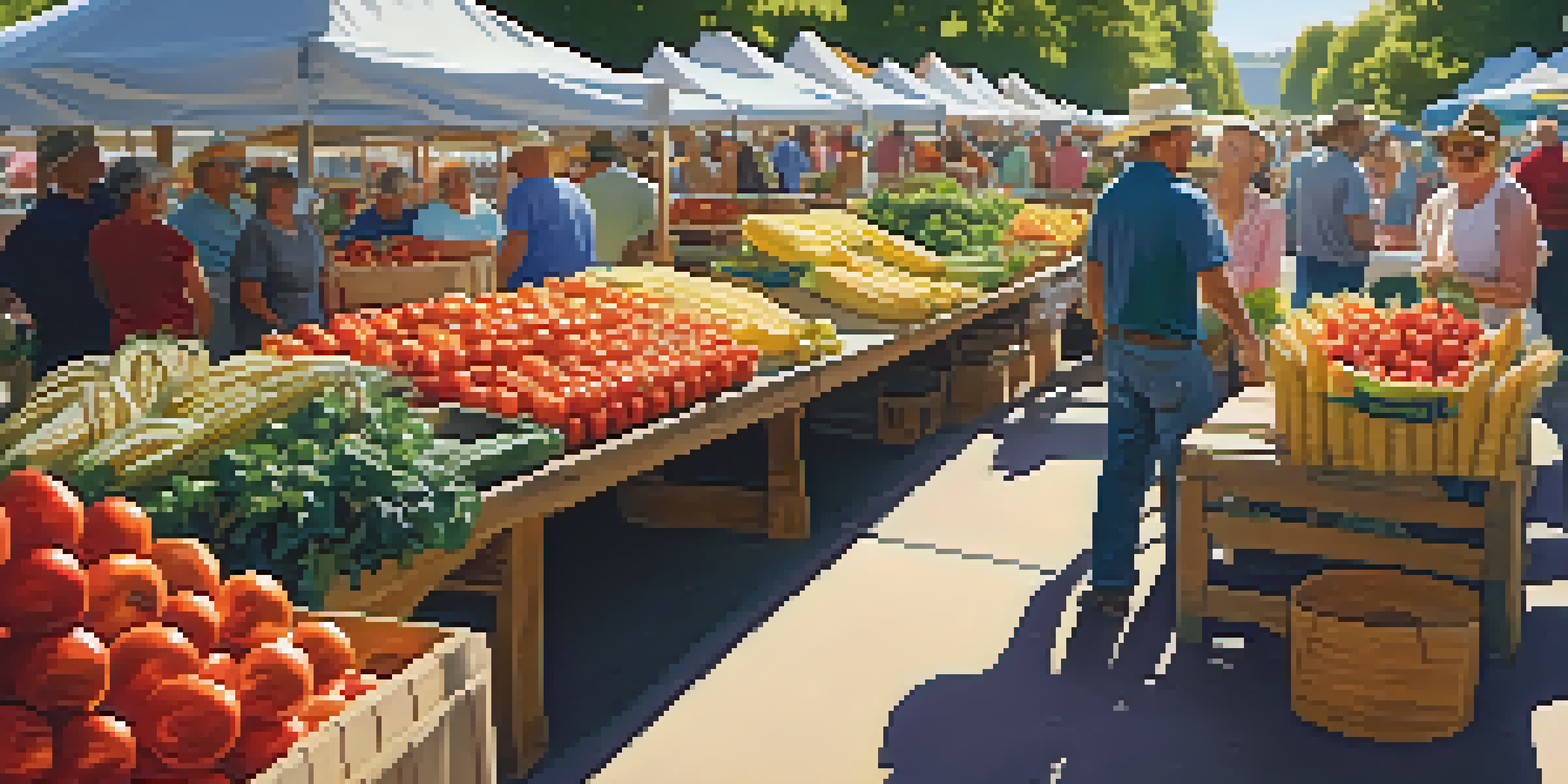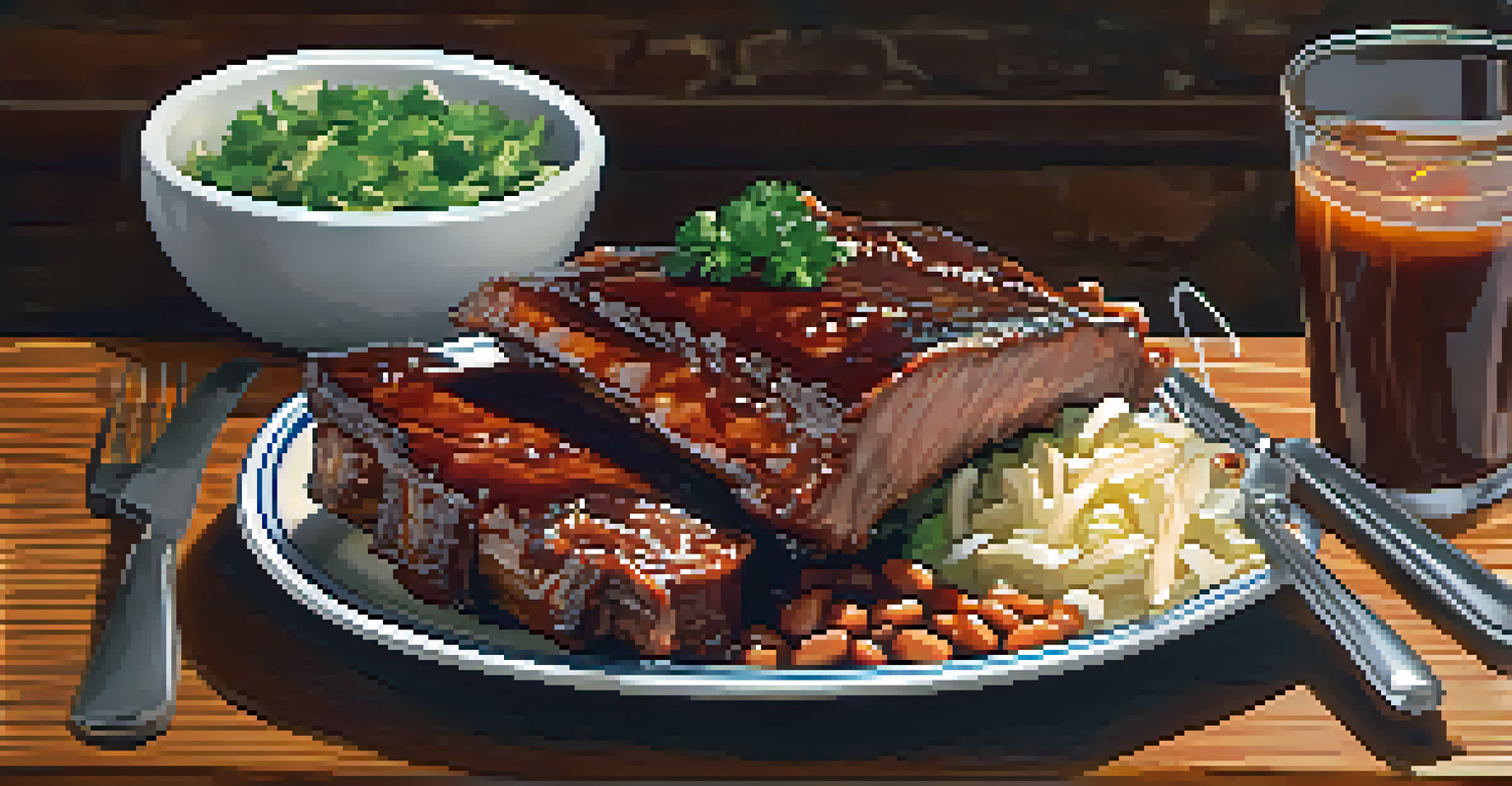The Evolution of Missouri's Culinary Traditions

The Roots: Native American Influences in Missouri Cuisine
Long before European settlers arrived, Missouri was home to various Native American tribes who laid the foundation for the state's culinary traditions. They cultivated crops like maize, beans, and squash, often referred to as the 'Three Sisters.' These ingredients not only nourished the tribes but also became staples in Missouri's later dishes.
Food is the ingredient that binds us together.
Native Americans also developed techniques such as smoking and drying meats, which have influenced how Missourians prepare and preserve food even today. Their deep connection to the land and seasonal cooking practices taught settlers the importance of using local ingredients.
As settlers began to adopt these food practices, they blended them with their own culinary traditions, creating a rich tapestry of flavors that still defines Missouri cuisine today.
Colonial Times: European Settlers and Their Culinary Contributions
In the 18th and 19th centuries, European settlers brought their own flavors to Missouri, introducing dishes that reflected their homelands. German immigrants, for example, contributed sausages and sauerkraut, while French settlers added rich sauces and pastries to the mix.

This blend of European culinary traditions led to the creation of unique dishes like the famous St. Louis-style barbecue, which showcases a mix of flavors and cooking methods. The emphasis on communal meals became a cornerstone of Missouri dining culture, as families gathered around tables to enjoy hearty, home-cooked meals.
Native Roots Shape Missouri Cuisine
Missouri's culinary traditions are deeply influenced by Native American practices, particularly through the use of local ingredients like maize, beans, and squash.
As these various influences mingled, Missouri's culinary landscape began to take shape, showcasing a fusion of flavors that would attract food lovers for generations.
The Influence of African American Cuisine on Missouri's Food Scene
African American cuisine has played a pivotal role in shaping Missouri's culinary identity, particularly in the realm of Southern cooking. Enslaved Africans brought their rich culinary traditions to the region, utilizing local ingredients to create flavorful dishes that are still celebrated today.
The discovery of a new dish does more for the happiness of mankind than the discovery of a star.
Soul food, characterized by dishes such as fried chicken, collard greens, and cornbread, emerged from this heritage and has become a beloved staple in Missouri. Restaurants and home kitchens alike showcase these recipes, preserving the cultural significance and flavors of African American culinary traditions.
This influence is evident in Missouri's food festivals and community gatherings, where soul food takes center stage, reflecting the resilience and creativity of a culture that has deeply enriched the state’s food scene.
Missouri's Barbecue: A Culinary Icon and Cultural Staple
When it comes to food, Missouri is perhaps best known for its barbecue, particularly the St. Louis style. This method emphasizes a unique blend of dry rubs, sauces, and smoking techniques that set it apart from other regional styles. The use of pork ribs, in particular, has become synonymous with Missouri barbecue culture.
Barbecue joints dot the landscape, each claiming to have the best recipe, which often leads to friendly debates among locals about which spot reigns supreme. Festivals celebrating barbecue culture further solidify its importance in Missouri, where enthusiasts come together to enjoy food, music, and community.
Barbecue: Missouri's Culinary Icon
St. Louis-style barbecue, characterized by its unique techniques and flavors, has become a defining aspect of Missouri's food culture.
This culinary icon not only showcases the state's diverse influences but also highlights the communal nature of dining, as families and friends gather to share a meal infused with rich flavors and tradition.
Modern Trends: Farm-to-Table and Local Sourcing Movements
In recent years, Missouri's culinary landscape has seen a resurgence of interest in farm-to-table dining and local sourcing. Chefs and restaurants are increasingly prioritizing fresh, locally grown ingredients, which not only enhances flavor but also supports local farmers and economies.
This movement has led to a revival of traditional cooking methods and an emphasis on seasonal ingredients, creating a dynamic dining experience that celebrates the region's agricultural bounty. Diners are now more aware of where their food comes from, fostering a deeper connection to the land and its resources.
As a result, Missouri is becoming a culinary hotspot, attracting food enthusiasts who appreciate innovative dishes that pay homage to the state's rich agricultural heritage.
Cultural Festivals: Celebrating Missouri's Culinary Diversity
Missouri's culinary traditions are celebrated through various cultural festivals that highlight the state's diverse food scene. Events like the St. Louis Food Truck Festival and the Kansas City Renaissance Festival draw crowds eager to sample a wide range of local cuisine.
These festivals not only showcase traditional dishes but also promote innovation and creativity among local chefs and home cooks. Food lovers can experience everything from classic barbecue to modern twists on regional favorites, all while enjoying live music and community spirit.
Sustainability Drives Modern Dining
A growing emphasis on farm-to-table dining and sustainability is reshaping Missouri's culinary landscape, fostering a deeper connection to local agriculture.
Such events foster a sense of pride in Missouri's culinary heritage and encourage collaboration among chefs, farmers, and food enthusiasts, strengthening the fabric of the state's food culture.
Future Directions: Embracing Sustainability and Innovation
As Missouri's culinary scene evolves, sustainability and innovation are becoming key themes. Chefs and restaurateurs are exploring ways to reduce waste, utilize renewable resources, and incorporate plant-based options into their menus. This shift reflects a growing awareness of environmental issues and a commitment to a more sustainable food system.
Moreover, technology is playing a role in this evolution, with food delivery apps and online markets allowing consumers to access local products more easily. This accessibility encourages a deeper connection between producers and consumers, fostering a culture of support for local businesses.

As Missouri continues to embrace these changes, its culinary traditions will undoubtedly adapt and thrive, ensuring that the state's rich food heritage remains vibrant for future generations.